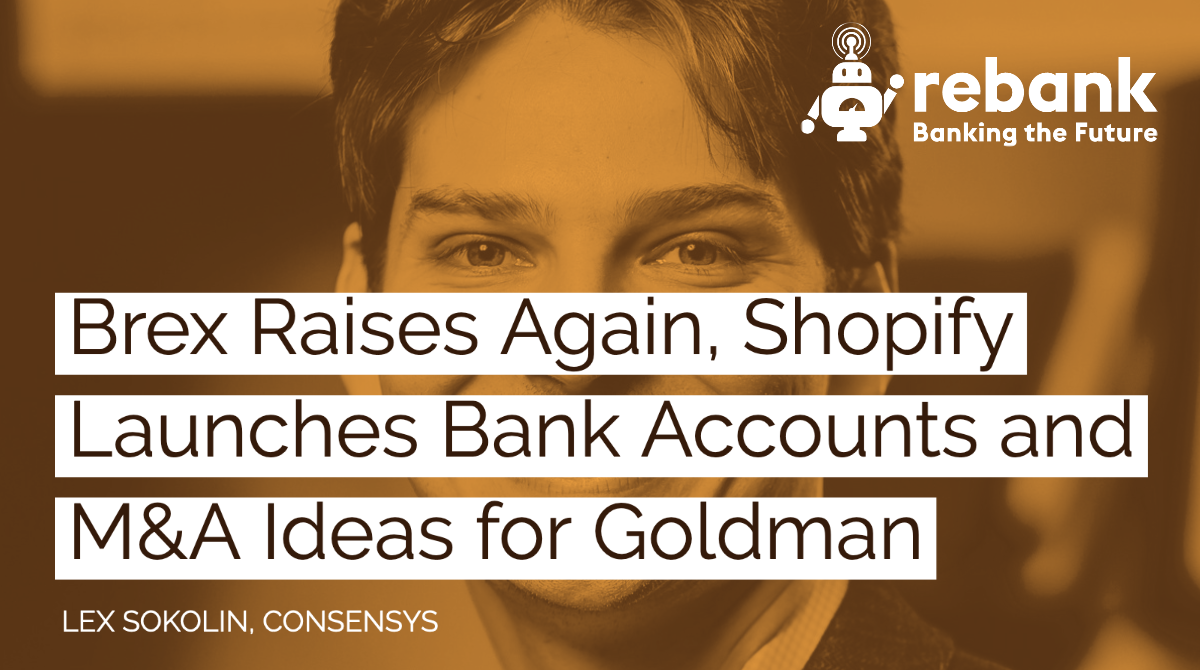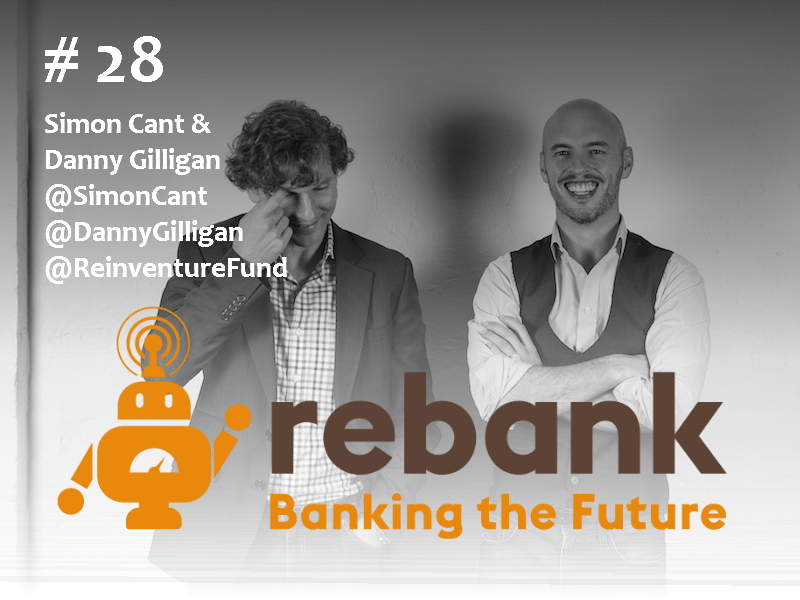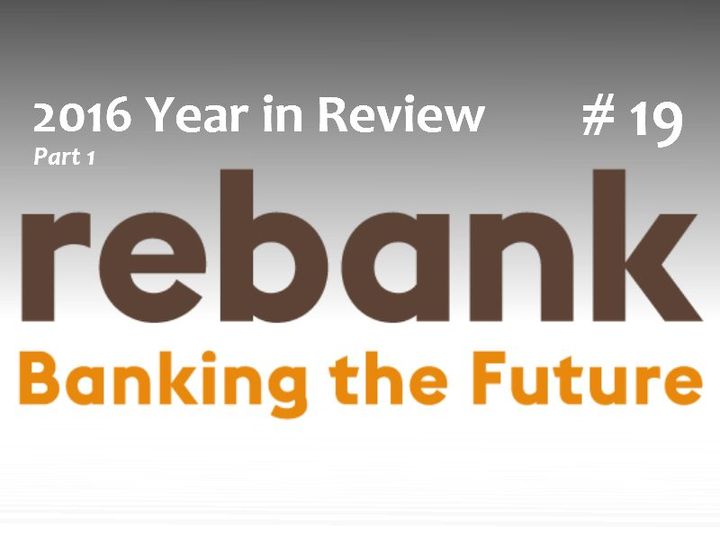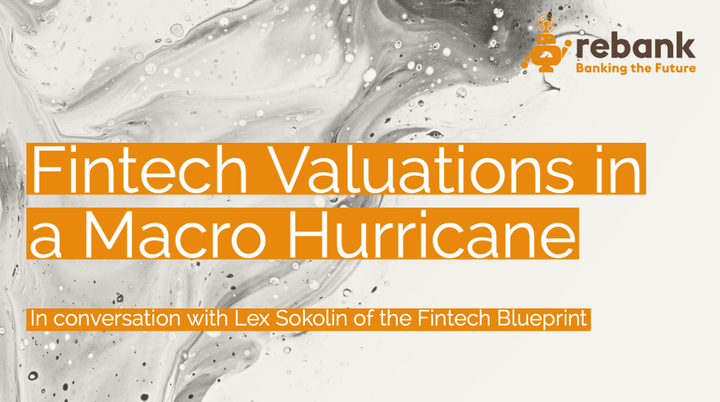Brex Raises Again, Shopify Launches Bank Accounts and M&A Ideas for Goldman

In this episode, we’re joined by Lex Sokolin to talk through a few recent events that are indicative of the fintech world right now.
Brex raised an additional $150 million at a slightly improved valuation vs. its last round just as Monzo is reportedly looking at a 40% down round. Why?
Shopify launched bank accounts for its merchants and a consumer app that's effectively an Amazon competitor plus Klarna-like functionality. At the same time, as it worked with Facebook to support the launch of Facebook Shops and joined the Libra Association. Lots going on.
Lastly, Lex explains why Goldman’s M&A activity over the past couple years leads to the natural conclusion that they should buy Schwab.
Full transcript:
Will Beeson:
Lex Sokolin, welcome to Rebank.
Lex Sokolin:
Great to connect again.
Will Beeson:
We've been so focused on other things, you and I, over the past few weeks, that we haven't had a chance to connect and just digest some of the most interesting stuff that's been going on. One piece of news that jumped out for me this week was the Brex fundraise. So, Brex, I know you find them to be an intriguing company. I think many of us do. Such an interesting model. They launched during boom times, effectively extending credit to arguably otherwise uncredit-worthy startups. And that has effectively been a powerful hook into other financial services. They launched Brex Cash recently, I guess it would have been 2019 at this point, as a way of just deepening engagement with their core customer base, the customer base that previously really wasn't served, hardly at all. I wonder if you have any thoughts on the fundraise, and Brex more generally.
Lex Sokolin:
Do I have thoughts? I have so many thoughts. It's been a weird couple of months because you'd think the quarantine would create this crunch for FinTechs with high valuations. And it has for some, so Monzo and it's 40% down round have been hitting the headlines. At the same time, we've seen a flurry of activity. Companies getting bought, companies continuing to raise unicorn rounds, and there's something about the current environment that's really catalyzing scrambling, and potentially catalyzing venture investors doubling down on their portfolio bets. You double down on the bets, you think are going to make it. And so Brex raising 150 million bucks at a moment in the economy where small businesses are totally and utterly decimated, seems to me like a high vote of confidence for their model. Alternately, it's just like we have to save this asset. It's important to us from a portfolio perspective because it's so expensive.
Lex Sokolin:
So, to reframe what Brex is doing, as you said, is they started out giving out money to startups. Silicon Valley Bank is normally in that business. Banking Silicon Valley startups and understanding the credit of what it means to help a young company that doesn't have normal cash flow. And Brex got into this game through a credit card that was an employee credit card. So, let's say you have a team of 10, 20, people, and you want people to be able to spend and for you to have controls over that spending, and then somehow to secure that with your startup equity or kind of venture funding. So, Brex targeted that segment, very much a Valley company, and they were able to very quickly grow into a brand that lots and lots of people in Silicon Valley knew, understood and respected.
Lex Sokolin:
To me, it's a funky thing. It's not even a secured lender or an online lender that has a deep understanding of sort of personal credits. It's really just handing out credit and money to companies that are very difficult to bank. And seeing a valuation justifying $150 million check, which would be multibillion dollar valuation, is super weird. In particular, it's weird based on a comparison, and the comparison is OnDeck. So, OnDeck is a small business underwriter, it's a FinTech credit company, and OnDeck is also a non-bank company, the way Brex is a non-bank company, but wants to provide banking services. On Deck is publicly traded. When they IPOd they were worth over a billion and a half, today they're worth 45 million. And the reason they're worth 45 million is all the FinTech stuff makes them more efficient and they can serve small businesses better, and all the good stuff.
Lex Sokolin:
The reason they're worth 45 million is small businesses are completely crushed and the debt is completely unpayable and their loan portfolio is shedding millions and millions of dollars of value because of the reality that your coffee shop is closed. And so you look at like a mature business, like OnDeck, which has all this credit exposure and good technology and just a completely crushed valuation, and in my mind there's just no way that Brex should be more valuable than a company like On Deck. But there's a 10X difference today, I think, in what those valuations are.
Will Beeson:
Yeah. Well, it'd be great at some point to connect with a real venture expert, valuation expert, maybe we can get one of our friends on at some point to talk us through why that makes sense, looking through the distortion goggles of venture investing. But the one piece, I guess, that does immediately jump out, not that justifies valuation, is that Brex offers additional products around lending to its customers. Which I don't know if OnDeck does, but I think of On Deck as being a pure play SME lender.
Will Beeson:
I think there's some interesting pieces in here, one which might lead us on to another topic, which we can discuss, Shopify and some of the recent announcements it's made. But with Brex and with the cash account, this is if I think back, a point that I floated around WeWork, rest in peace. It would have been, I don't know, probably a year ago. A year plus ago. In my mind, there was this phenomenal opportunity for WeWork to basically offer business banking accounts and corporate cards to all of its business tenants, and encourage them to use that for payroll, for expenses, keep, obviously, your cash balances and the WeWork account.
Will Beeson:
So, if you're WeWork, or if you're Brex in this example, you're generating a transaction interchange and you're generating float on deposits. It's free revenue if you're already core to the experience that your customers are having. So, WeWork didn't go that route, but I believe we'll see an increasing number of brands of companies do that. One this week, maybe this week and last week, they've been active lately, Shopify. So, Shopify is core to a very large contingent of online sellers. Basically anyone who wants to easily set up to sell any goods they have across the internet, Shopify is the place to go, and Shopify ends up being the place where they get paid. Traditionally the sole trader account is just nonexistent. Like a genuine banking offering that's tailored to sole traders, to one man, one woman, businesses, be they plumbers or be they online knitting salespeople. It just doesn't exist.
Will Beeson:
So, what Shopify has done is effectively stepped in and launched a business banking account, in all effects, with the opportunity to spend money on a card. And they're basically rolling this out to their merchants. So, it is business banking, but it's a replacement for the personal bank accounts that so many of these merchants are using to run their businesses. The interesting piece here is that they're kind of stepping in almost halfway through the traditional financial services value chain, which from the merchant standpoint, it's get paid, transfer the money into a bank account, and then spend the money out of a bank account. And if it's for your own personal needs, then you're transferring a portion of it into your own personal bank account and spending it that way. Here, you don't even need to make all those transfers. The money never needs to arrive to the final user account at the Barclays or Chase or HSBC, or whatever traditional bank it would have been.
Will Beeson:
You're effectively stepping in halfway through and saying, "Here are all the tools you need to do everything that you would have liked to do." And why does this work in the Shopify example? It works in the Shopify example because there's a dedicated, critical mass of users who all have this need. And importantly, there's cash coming in. And I think if you kind of expand that to think about other potential verticals, basically it's any time there's a significant amount of cash coming in to a dedicated affinity group almost. In this sense, it's online sellers. It could just as easily be YouTube creators. It could be Spotify artists. That's kind of on the quote unquote merchant side.
Will Beeson:
But similarly on the consumer side, it could be fans of a specific sports team. It could be Fortnite players. And as part of the rewards that you're getting, part of the incentivization to use the Fortnite account, is that you get benefits, non-cash benefits, from Fortnite. So, whatever you need to spend money on in the game, you get a discount, you get some of that for free. At the end of the day, what Fortnite, in that case, would be doing is offering some of its zero cost goods and services for free to its account holders, as a way of incentivizing usage, debit spend, maybe it's credit spend, maybe it's deposit balances, all of which again are net new revenue items, which are for anyone with a genuine following like that, significant from day one. So, it'd be fascinating to see where this goes.
Lex Sokolin:
Yeah. And I think if you zoom out for the underlying trends, the last month has seen an incredible increase in online shopping and online engagement with different video games and platforms. And so you have this gold rush to build more commerce into the web and into mobile. And so what Shopify has done, to me, is a really strong move. They were the backend infrastructure for a whole bunch of web commerce, and it wasn't really their brand that was in front of people, it was the brand of the merchants.
Lex Sokolin:
And now they've launched an app, a mobile app, which is called Shop, which is like an Amazon competitor. It's a straight on Amazon competitor, and they just took and the aggregated all of that footprint of all of the merchants across all the different products that they power, and just like wrap their name around it. I mean, you can imagine WordPress, the website maker, or Squarespace, the website maker, launching an app called Squarespace, and instead of a website maker, it's just going to be all the Squarespace sites in internally as features. And so there's just a huge flip going from a provider of infrastructure to being a platform, a destination.
Will Beeson:
They also launched Shop Pay Installments, basically pay after purchase akin to a Klarna or an Affirm, but it's pay in four installments if you're the consumer, no extra costs, zero interest. I think the merchant pays a small amount, but it's effectively built into the checkout experience now. This is legit payments and FinTech space.
Lex Sokolin:
Yeah. So, it's a total flip from being behind the scenes, like we'll help you launch your brand and your experience, flipping then into a branded platform to capture consumer attention, which is way more value, which is what Amazon's strength is. And then Stripe's in there, and all of these other enabling things are in there, and so building in finance as a feature, and this is something that we've been talking about for years, where embedded finance is just a feature. Like is there really a reason for financial brands to exist or is it just a generic? Like is there a reason for Tylenol to exist as a drug brand or is it just Ibuprofen that you buy from a drug store and you don't care where it comes from? And I think finance is like Ibuprofen, I don't care where the banking comes from. And Shopify's banking, it's not a Shopify bank, it's a third party. They're renting a bank, they're renting banking as a service.
Lex Sokolin:
You go back to Brex, they're renting their bank. They, it's not like the breakfast bank account. It's, I think, Radius Bank that's supporting that. And it's the tech firms that are building all the infrastructure on top. So, Brex's trying to build their own core banking on top of it, shopify is building all of the cash flow, the account management, the accounting, the routing, the reporting, the payment processing interfaces. That's the work of the tech firm to connect to the consumer, and then you totally disintermediate the financial service. And this is totally flipped. It's totally opposite of how a finance firm thinks about it, which is like, "We got to go and get some core banking tech infrastructure so that we can run our deposits on it." And it's just such a weird flip.
Will Beeson:
The interesting competitive nuance here is that Shopify appears to have a close relationship with Facebook. And I think that Shopify was even involved in supporting Facebook with the launch of the Facebook and Instagram stores, which was another new announcement, no doubt coated, inspired, of past week or two. Which is a very similar model at the end of the day, to the Shop app.
Lex Sokolin:
Yeah. Which walled garden do you want to be in? Like, do you want to be in the Instagram walled garden? Do you want to be in the Shopify walled garden? It's really all these companies trying to put us into boxes.
Will Beeson:
And interestingly Shopify also joined the Libra Association as a member, promoting and progressing that vision. So, on the one hand, they're supporting, contributing, to the ability, presumably, for Libra to eventually become a payment mechanism within Facebook stores. And they're also launching a standalone, effectively, competitor. It'll be interesting to see how closely these offerings mirror each other, how much synergy there ends up being longer term versus how quickly they become direct competitors.
Lex Sokolin:
It's quite wild what Facebook has been able to do over the last several months. So, they have Facebook shops, like you said, which reaches into Instagram, which reaches into WhatsApp and Facebook messenger for customer support. So, they're weaving these consumer pieces into a customer experience for purchasing. And I'm sure influencer marketing is attached to this, advertising's attached to this.
Lex Sokolin:
If you haven't seen their marketing campaign, it is so amazingly... I don't know who designed it. It's so silly because it focuses on this letter press shop, like this shop where two crafts people are using ink drawings on handcrafted paper cards, to send congratulations or wedding stuff to people. And these artisans are being advertised for their letter craft by Facebook, which has destroyed the entire content industry. All of the newspapers, all the books, and everything handcrafted and paper-based has been completely decimated by social media and news content on the web. Amazon and Shopify and these platforms which have subsumed e-commerce and standardized it, making mom and pop sort of shops completely impossible to stand alone without being involved in a platform. And so you've got these tech behemoths and they're using the story of the handcrafted letter press as a way to promote their quarantine eCommerce platforms. I just thought that was so disjointed and weird.
Will Beeson:
I guess that's what makes it quaint. Somehow a reminder, an invitation to reminisce about the days of yore before we were trapped in rental cars and bathtubs.
Lex Sokolin:
The perfect artifact would be to purchase a digital frame, or like an iPad and the iPad displays the letterpress card and that's what you mount and plug into the electric socket.
Will Beeson:
All right. So, the last piece I wanted to pick up with you was Goldman, and the interesting M&A that they've recently done in the FinTech space, WealthTech, I think more specifically, and what we should be reading into this as it relates to their future positioning.
Lex Sokolin:
So, Goldman's been trying to reorient their business from a very luxurious, elite private brand into something that has a footprint across the entire country, and is much more retail, much more maybe mass affluent. They're not necessarily using the Goldman brand for this, they're using the Marcus brand, but there are a number of assets that are being aggregated into that retail footprint. The reason for it, and I think Goldman saw the writing on the wall five years ago, if not longer, was that without a large deposit base, like the one that JP Morgan has or Citigroup or Wells Fargo or Bank Of America, the businesses they hold, although unbelievably profitable and enriching for Goldman employees, the businesses they hold are very volatile. So, investment banking revenues are very correlated with the market cycle, capital market revenues are also very correlated with trading ability and asset values. So, they're very volatile.
Lex Sokolin:
And then number two is they're all in a secular decline, meaning that the pricing within capital markets is collapsing, because you have electronic trading and all sorts of other models like the Robin Hood model, pushing on the price of what it costs to trade either in equities or in fixed income and so on. And so there's a secular trend to collapse profit pools in capital markets and in investment banking. As you know, a whole bunch of Silicon Valley companies have been trying to do direct listings to avoid the banker fees. Long story short, there's a lot of risk embedded in the pure investment banking model, to the point where lots of articles today are saying BlackRock is the king of wall street. That BlackRock has the asset manager footprint of whatever it is, 5 trillion in assets and that is who matters in 2020. And that is who has taken the top spot in financial services relative to 15 years ago, where it's the Goldman Sachs and the Morgan Stanley and the Lehman brothers that mattered from a finance perspective.
Lex Sokolin:
And so Goldman has been trying to position to have this deposit base and to provide investment services and to build bridges into lending and wealth, and all of its different pieces. And so it spent over a billion bucks in order to get that done. You know, Marcus, the lending company. There's also a company they bought for, I think 750 million called United Capital, which is a financial advisor, technology plus sort of terrestrial footprint, lots and lots of financial advisors using that software and a meaningful amount of AUM flowing through it. They've also purchased a couple of digital wealth plays. One is called Honest Dollar. Another one was, I forget the name, but it was founded by one of the-
Will Beeson:
Clarity Money?
Lex Sokolin:
Clarity, exactly. One of the Dell brothers. And just this year, they bought two things. The first one was a Folio FN, which is a $10 billion custodian for RIAs, for independent RIAs. 10 billion is very small in the RIA game. TD is 500 billion. Schwab is over a trillion. Purging is, I believe, a trillion or more. And so 10 billion is very small, but it's a gem. People really liked the technology. And so they bought Folio FN. And then if you do a little bit of digging, Folio FN also, just a couple of weeks before, had acquired the client accounts of Motif Investing. Motif Investing is a direct indexing company that Goldman funded almost a decade ago. And the team from Motif Investing ended up going to Schwab. So, the founder and the tech talent ended up going to Schwab, which has a direct indexing program, which is called Slices. And it's really about this kind of retail investing market. But then the IP and the clients went to Folio FN, or maybe the IP went to Schwab.
Lex Sokolin:
But Folio FN got the clients, and then Folio FN ended up being purchased by Goldman, in a sort of really weird tri-party transaction. And so that got me thinking that basically all the stuff Goldman's doing is at the edges and it's buying high performing assets at the edges of wealth tech. So, yeah, 750 million is a lot of money, but compared to Morgan Stanley buying E-Trade, it really does not matter at all if you spent 750 million on United Capital. And compared to E-Trade again, it doesn't matter if you buy Folio FN. I think what matters is a large transformational acquisition, which bolts onto Goldman a real footprint. Which is why I kind of started thinking if you were to run Goldman, which is about 60 billion in market cap, what can you afford to buy that would get you on the same footing as Morgan Stanley E-Trade or a Bank Of America Merrill Lynch, or JPM with its footprint?
Lex Sokolin:
I think they should just get it over with and join forces with Schwab. Schwab's a leader, for sure, in online brokerage. They've got an amazing customer footprint, but they're very retail and they know how to do the web and how to do mobile right. And they cost about 40 billion. And so I'd love to see that transaction come to fruition because I think that would really be a pretty powerful firm.
Will Beeson:
Love it. What an interesting idea. I would say thought experiment, but who knows? Perhaps it's not. I mean, it actually makes a lot of strategic sense.
Lex Sokolin:
You heard it here first. Yeah.
Will Beeson:
Very compelling. All right. I think that's all we have time for today. Fantastic to connect with you, Lex, as always. I highly encourage everyone to subscribe to Lex's newsletter, the FinTech Blueprint. Lex, where can they find that?
Lex Sokolin:
www.fintechblueprint.com.
Will Beeson:
Excellent. Lex Sokolin, thank you very much for joining us today.
Lex Sokolin:
My pleasure, see you next week.


